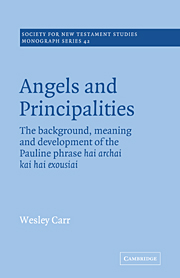 Angels and Principalities
Angels and Principalities Book contents
- Frontmatter
- Contents
- Preface
- Abbreviations
- General Introduction
- PART 1 The Background to Paul's Thought on the Powers
- PART 2 Exegesis of Pauline Texts
- PART 3 The post-Pauline development
- 6 Texts within the New Testament
- 7 Ignatius of Antioch
- 8 The angelomorphic Christology of early Jewish Christianity
- 9 The Greek apologists
- 10 Clement of Alexandria
- 11 The influence of gnosticism
- 12 Origen
- Conclusion to Part 3
- PART 4 Final Remarks
- Notes
- Select Bibliography
- Index
11 - The influence of gnosticism
Published online by Cambridge University Press: 06 January 2010
- Frontmatter
- Contents
- Preface
- Abbreviations
- General Introduction
- PART 1 The Background to Paul's Thought on the Powers
- PART 2 Exegesis of Pauline Texts
- PART 3 The post-Pauline development
- 6 Texts within the New Testament
- 7 Ignatius of Antioch
- 8 The angelomorphic Christology of early Jewish Christianity
- 9 The Greek apologists
- 10 Clement of Alexandria
- 11 The influence of gnosticism
- 12 Origen
- Conclusion to Part 3
- PART 4 Final Remarks
- Notes
- Select Bibliography
- Index
Summary
No area of early Christian thought contains more references to intermediaries than gnosticism. All gnosis, using the definition for this suggested by the Messina Colloquium, has this tendency, but our concern is limited to ‘gnosticism’, a specific phenomenon of the second century. Because the writings of Irenaeus and, on this particular question, of Tertullian are closely connected with gnosticism, they are also discussed in this chapter. This is a limited study, which aims not at surveying the various understandings of intermediaries that appear in the gnostic texts, but only at continuing work at establishing the interpretations of the powers that were current in the second century and determining the use made of the Pauline texts on the subject.
Irenaeus
The powers played an important part in all the various systems that Irenaeus combats in adversus haereses. Simon Magus was considered the source of all gnostic error. He employed the myth of the fallen angels and of the powers, which were generated to create the world. Redemption was thus both from the Law, as given by angels, and from the world, as created by them. A similar distancing of God from the world by means of intermediaries is discernible in Saturnilus, who, following Menander, argued that the Unknown Father created ἀγγέλους, ἀρχαγγέλους, δυνάμεις καί, ἐξουϭίας, and that by the seven chief angels was the world made (adv.haer. 1.17f). Clearly Simon, Menander and Saturnilus relied upon Jewish or Judaeo-Christian material in their arguments, particularly in their use of Gen. 1: 26.
- Type
- Chapter
- Information
- Angels and PrincipalitiesThe Background, Meaning and Development of the Pauline Phrase hai archai kai hai exousiai, pp. 158 - 167Publisher: Cambridge University PressPrint publication year: 1981


